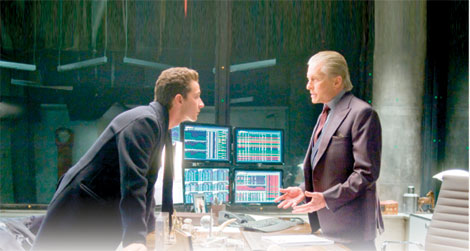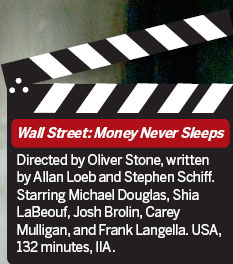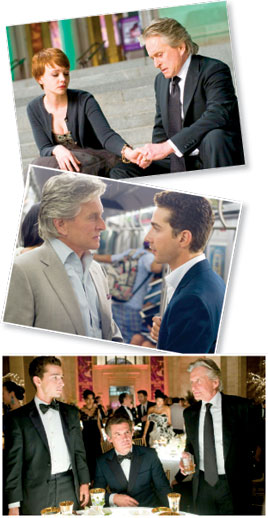No time like the present
Updated: 2010-09-18 07:17
By Elizabeth Kerr(HK Edition)
|
|||||||

Oliver Stone revisits one of his greatest successes in a timely sequel, reports Elizabeth Kerr.
When Michael Douglas put on his pinstriped power suit as Gordon Gekko and uttered the phrase, "Greed is good," back in the junk bond-crazy Reagan years, everyone sat back and snickered at the outrageous audacity of it. In a film about a subtle and nuanced as a jackhammer to the head, the corporate raiding '80s was reduced to a single slogan that reverberated for years after it. Now, in the post-recession, skeevy banker landscape littered with a detritus of a global financial meltdown that resulted in the worst financial debacle since the Great Depression, those words - meant as an ironic criticism - seem like a warning. We carried on in the Gordon Gekko mindset and look where it got us.

Hollywood has never been known to be truly in step with the masses, partly because production schedules, meddling agents, and star script approvals/changes won't allow for it. Timeliness is not the industry's forte; that's for television, which has the increasing power to be ultra-specific and fast. Television responds to the zeitgeist much faster than mainstream cinema, and it's one of the reasons the movies can feel out of step. Which is not to say it hasn't tried addressing the fears of the masses before. The China Syndrome may have been a "lucky" stroke (Three Mile Island melted down two weeks after its release), but The War of the Worlds, All the President's Men, To Kill a Mockingbird, and Women in Love were all swift reactions to widespread public anxiety of some sort, but did so in the years when making a film was a relatively speedy endeavor.
Conversely, The Green Zone (Iraq war boondoggle), Rendition (illegal arrests followed by overseas interrogation), Apocalypse Now (the Vietnam War), Black Hawk Down (Somalia boondoggle), and Philadelphia (AIDS) similarly addressed "current" issues, though usually years after the issue arose. The wait for a big budget, star-studded film about phone tapping continues, but schlock filmmaker Robert Rodriguez has managed to crank out a B movie about the Arizona border kerfuffle. (Machete) and gay rights remain the purview of TV (True Blood).
For whatever faults he may have, Oliver Stone's agitative nature and relatively rapid work ethic make him a little quicker on the draw. He's also just a little prescient when it comes to The Big Message; he did paint the most notable portrait of a cynical, media saturated world in Natural Born Killers. In 1987's Wall Street, Charlie Sheen played Bud Fox, Gekko's young apprentice and the audience's de facto avatar. He was the moral center of the film, at first seduced by the glamour of Gekko's slick trading ways and then disillusioned by its real impact, illegality, and excess. He spoke for us when he asked, "How many boats can you water-ski behind?"

Well, it's almost a quarter century later and in Wall Street: Money Never Sleeps Gekko is being sprung - literally and figuratively - and the timing is oh so apropos. This time around, the protege is Jacob Moore (Shia LaBeouf), at first the protege of old-school investment banker Lewis Zabel (Frank Langella). Jacob is a new breed of banker: idealistic, ethical, and far-sighted. After some vicious, revenge-based rumors drive Zabel and the bank they work at to ruin, he strikes up a weird friendship with the fresh-out-of-prison Gordon Gekko (Douglas), largely based on the facts that they both want to see rival banker Bretton James (Josh Brolin) pay for his perceived crimes and that Jacob is engaged to Gekko's estranged daughter Winnie (Carey Mulligan). Cue the lessons on how the "game" is played.
The most notable new element to Money Never Sleeps is in the audience itself. Wall Street pulled the proverbial curtain back to give a glimpse of the shenanigans going on behind the stock exchange scenes. It was greeted with awe and head-shaking wonder at the characters' monetary bravado. But it never seemed dangerous because it was the '80s and we were all getting rich. What's to complain about? In 2010, however, there is no mystery, and the news that we all see or read everyday is more stomach-churning than awe-inspiring.
In typical Stone fashion, there's a great deal of righteous indignation here, and even more sermonizing on the corruptibility of capitalism (courtesy of Gekko's so-called musings). But unlike many sequels that come years after the fact, Stone has accepted and included the movement of time, however heavy handed he is in doing it. Winnie runs a non-profit online news portal, Jacob's pet investment is a 100 percent green alternative energy, and the whole film is cluttered with graphics that make you feel as if you're watching a Bloomberg finance update.
But those are just bells and whistles for Stone and writers Allan Loeb and Stephen Schiff to sound off on Wall Street chicanery. When Gekko lets his fury over his prison sentence manifest, he ironically states he went away for, "a victimless crime," when Jacob pesters Lewis for the truth of the bank's status because of the 15,000 jobs at risk. Bretton and his treasury cohorts meet in dark rooms and speak in secretive hushed tones. Subtle? Not a chance. This is an Oliver Stone movie to the core.
Money Never Sleeps moves at lightening speedy and is buoyed by strong performances in support of the bland LaBeouf. Brolin emanates a more polished brand of oiliness than that of Gekko version 1 and is almost elegant in his oblivious entitlement.
And Douglas' return to the character that won him his only Oscar is flawless. His fragile relationship with Winnie is the emotional core of the film, though his redemption doesn't quite ring true. He's the same Gekko - which oozes through in brilliant little flashes - just older, more cautious, and a touch more concerned with his legacy outside the halls of power.
Money Never Sleeps is overwrought and simplistic, but it could be the most current film to hit cineplexes in a long time. Gekko's re-emergence is just in time to mirror the fallout of the real world financial collapse. Like Gekko, the system is likely going to stay the same, Stone and Co. seem to be saying. It will just be more careful about it.
Wall Street: Money Never Sleeps opens in Hong Kong next Thursday.
(HK Edition 09/18/2010 page4)